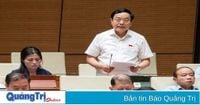On May 9, 2025, the National Assembly of Vietnam held discussions regarding the draft Law on Special Consumption Tax (amended), a topic that has sparked considerable debate among lawmakers. The session was led by Deputy Chair Nguyen Duc Hai, who facilitated a dialogue on the proposed changes to the taxation system.
Deputy Ha Sy Dong, a member of the National Assembly's Economic and Financial Committee, expressed his concerns about the proposed tax on air conditioners with a capacity between 18,000 BTU and 90,000 BTU. He suggested that the tax be removed, arguing that it aligns poorly with global trends. "Currently, no country imposes a special consumption tax on air conditioners," he stated, emphasizing that many nations focus on taxing harmful refrigerants instead. He pointed out that Vietnam’s approach to taxing air conditioners lacks justification since there are no alternative products available, making it an unreasonable burden on consumers.
Moreover, Deputy Dong supported the idea of taxing gasoline but urged a reconsideration of the tax structure. He noted that gasoline is currently subjected to both special consumption tax and environmental protection tax. "These taxes serve similar purposes, yet gasoline bears both because of the emissions it produces," he explained. His recommendation was to eliminate the special consumption tax on gasoline and solely apply the environmental protection tax, which he believes would streamline the taxation system.
Deputy Hoang Duc Thang also contributed to the discussion, particularly regarding the taxation of sugary drinks. He agreed with the government's decision to have the Ministry of Finance draft the law and suggested that the law should take effect from January 1, 2027. However, he raised concerns about including sugary drinks in the special consumption tax category, emphasizing the need for more scientific evidence to justify such a tax. "We should focus on public education to change consumption behavior before imposing taxes," he argued, highlighting the importance of understanding the broader implications of such a tax policy.
The issue of sugary drink consumption is increasingly pressing in Vietnam, where data shows a dramatic rise in consumption over the years. According to reports, the average consumption of sugary beverages soared from 18.5 liters per person in 2009 to 66.5 liters per person in 2023. This trend has raised alarms among health officials and prompted discussions about potential taxation as a means to curb consumption.
Dr. Angela Pratt, a representative from the World Health Organization (WHO), highlighted the detrimental effects of excessive sugar intake, particularly from sugary drinks. She stated, "Sugar has little nutritional value, and sugary beverages are harmful, especially when consumed in large quantities." The WHO has been vocal about the need for interventions to reduce sugar consumption, suggesting that taxation could serve as an effective public health measure. By making sugary drinks more expensive, the hope is that consumers will opt for healthier alternatives.
Evidence from other countries supports the potential effectiveness of such a tax. In Thailand, after implementing a special consumption tax on sugary drinks, average consumption decreased by 2.8% within two years, with soft drink consumption dropping by an impressive 17.7%. Similarly, Mexico saw a 6% reduction in sugary drink consumption in the first year of taxation (2014) and a further 10% drop the following year. In South Africa, one year post-implementation, there was a staggering 51% reduction in sugar consumption from sugary drinks.
These international examples suggest that imposing a special consumption tax on sugary drinks could yield significant public health benefits. The WHO has advocated for such measures globally, emphasizing that they are among the most cost-effective strategies to combat non-communicable diseases linked to excessive sugar consumption.
As the Vietnamese government deliberates on this draft law, the implications of such taxation extend beyond just financial considerations. The potential for improved public health outcomes, reduced healthcare costs, and a shift towards healthier consumption patterns are all compelling reasons to consider the proposed changes seriously.
In conclusion, the discourse surrounding the draft Law on Special Consumption Tax reflects a broader concern about public health in Vietnam. As lawmakers weigh the pros and cons of taxing air conditioners and sugary drinks, the overarching goal remains clear: to foster a healthier society while navigating the complexities of taxation policy.




